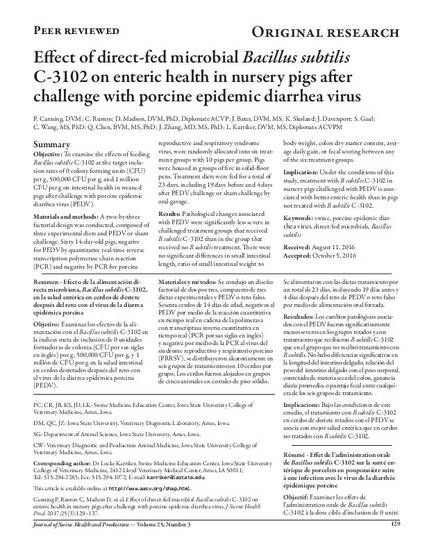
Objective: To examine the effects of feeding Bacillus subtilis C-3102 at the target inclusion rates of 0 colony forming units (CFU) per g, 500,000 CFU per g, and 1 million CFU per g on intestinal health in weaned pigs after challenge with porcine epidemic diarrhea virus (PEDV).
Materials and methods: A two-by-three factorial design was conducted, composed of three experimental diets and PEDV or sham challenge. Sixty 14-day-old pigs, negative for PEDV by quantitative real-time reverse transcription polymerase chain reaction (PCR) and negative by PCR for porcine reproductive and respiratory syndrome virus, were randomly allocated into six treatment groups with 10 pigs per group. Pigs were housed in groups of five in solid-floor pens. Treatment diets were fed for a total of 23 days, including 19 days before and 4 days after PEDV challenge or sham challenge by oral gavage.
Results: Pathological changes associated with PEDV were significantly less severe in challenged treatment groups that received B subtilis C-3102 than in the group that received no B subtilis treatment. There were no significant differences in small intestinal length, ratio of small intestinal weight to body weight, colon dry matter content, average daily gain, or fecal scoring between any of the six treatment groups.
Implication: Under the conditions of this study, treatment with B subtilis C-3102 in nursery pigs challenged with PEDV is associated with better enteric health than in pigs not treated with B subtilis C-3102.
Available at: http://works.bepress.com/chong-wang/108/

This article is published as Canning, P., C. Ruston, D. Madson, J. Bates, K. Skoland, J. Davenport, S. Gaul, C. Wang, Q. Chen, J. Zhang, and L. Karriker. "Effect of direct-fed microbial Bacillus subtilis C-3102 on enteric health in nursery pigs after challenge with porcine epidemic diarrhea virus." Journal of Swine Health and Production 25, no. 3 (2017): 129-137.